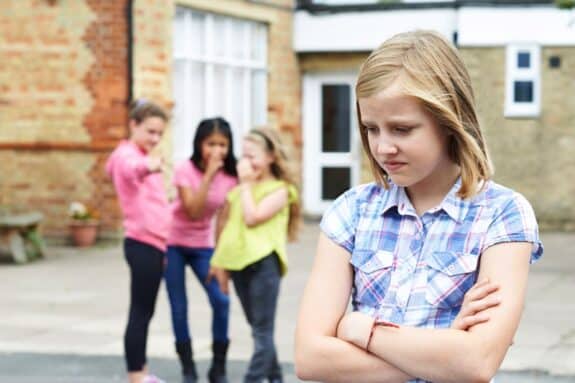Over the last 25 years, schools have shifted their discipline focus to reflect a “zero tolerance” policy. Under it, bullying and any form of violence or harassment is unacceptable – but has this action helped or hindered our youth? Is every disciplined child a bully, or have we been overly sensitized to negative behavior in school – perhaps to the point that we can no longer distinguish the difference between a bully and a kid who’s simply “being a jerk?” Or is there a difference at all? Some parents say no, but we believe there is a difference; here’s how and why.
The Difference Between Bullying and Being a “Jerk”
Any child can be a jerk. Maybe they’re having a bad day. Maybe no one has taught them that it’s not polite to say insensitive things to another child. Some children have emotional or developmental issues that hinder their ability to understand how their words or actions can affect others (we’ve dealt with that a lot in our son with ASD). Either way, jerks rarely say or do things with the intent of hurting others. Yet, even when the action is done with intent, it is typically a single incident – one that children can usually work out on their own or with the assistance of a classroom teacher. Disciplinary action is rarely needed (outside of maybe a minor consequence), parents do not typically need to get involved, and the matter tends to resolve quickly.
Bullying is different. It is intentional and systemic, and the victim is often targeted. And bullying can include more than just words or physical aggression. Intimidation, rumors, and embarrassing gossip can occur in school, out of school, and even online. School administration, parents, and even law enforcement may (and perhaps should) become involved to stop the bullying actions and protect the victim from further harm.
Helping Your Child Deal with a Jerk
Since most parents and their children have been conditioned to think of any mean or negative behavior as bullying, they may be at a loss when deciding how to deal with a child that is being a “jerk” instead of a bully. For example, parents may be unsure whether they should report the behavior or not. Rest assured that most jerk behavior can be corrected easily – perhaps with nothing more than a discussion between your child and the one that hurt them. However, this should be done in front of an adult, just to ensure that the conversation is constructive.
It is also important that parents use the right terms when discussing the hurtful behavior of a schoolmate. Do not call a child who has acted in a jerky way a “bully.” It can confuse them.
When Your Child is the Jerk
I’ve been the parent of the jerky child – more than once. That’s just life with a child on the spectrum sometimes. Yet, even children who do not have developmental or mental conditions can be jerks. It’s usually because they’re still developing impulse control and learning about empathy. So, when your child is the one being a jerk, try talking to them less about the consequences of “bullying” and, instead, help them understand why their words or actions were hurtful. If the problem persists, consider asking for outside help (which is what we did).
The Take-Away
Bullying is a serious issue – clearly – but when we call jerky behavior bullying, we minimize the impact that it has on the lives of real victims. Though changing our thought patterns can be difficult, it may hopefully help children better understand when to ask for help and when to walk away. Also, by teaching our children how to deal with “jerks,” we give them the tools they’ll need to deal with the adult jerks they’ll encounter at work, on the road, or even while shopping at the grocery store, which can be pretty important since jerks can be found everywhere, at all stages of life.







